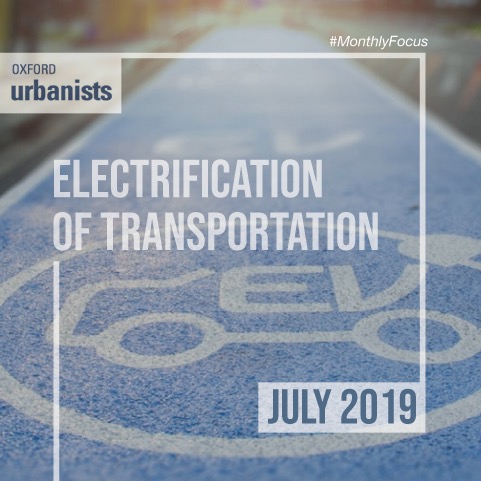Transportation Electrification
Photo via International Energy Agency
This July, Oxford Urbanists’ monthly discussion looks at the case for transportation electrification in cities. From the governance framework to the regional and micromobility scales, this conversation highlights the challenges in bypassing the fossil-fuelled, car-centred model as the unanimous alternative.
The ability to move people and goods holds a direct relationship with economic growth and the quality of life in cities. Its importance is evidenced by the fact that transport networks and systems are at the core of several objectives prioritized by the Sustainable Development Goals (SDGs). Indeed, they highlight the need to provide accessible, affordable and sustainable transport for all, especially to vulnerable groups, while reducing the per capita environmental impact of cities. Therefore, increasing universal access in urban areas, energy efficiency and improving air quality through the reduction of pollutant and GHG emissions are key drivers of the increasing emergence of electric vehicles (EVs) use.
Whether it is the result of public policies to improve mobility and reduce air pollution in cities, or the effect of market innovation, the expansion of transportation electrification to new transport modes is the subject of numerous studies and reports. Its important environmental benefits are contrasted with the multiple challenges for its wider implementation. Among the latter, availability, cost and performance of energy supply technologies are the main constraints - especially for cities in developing countries - to scale up the existing initiatives, both for public and private vehicles, and transition to an integrated electrical transport model.
Despite the many efforts to transform energy and mobility systems, global concern exists about the pace at which these two sectors will be able to adapt. Their transformation must meet demographic and economic growth, especially in the light of the sectors’ impacts on climate change, and the need to rapidly achieve transport-related climate objectives, without leaving anyone behind.
Oxford Urbanists’ monthly discussion this July looks at the case of innovation and infrastructure for the transportation electrification in cities. The conversation encompasses the governance framework, addressing from the regional to the micromobility scales, bypassing the fossil-fuelled, car-centred model as the unanimous alternative. Centering the attention in different examples points to a transition to electric-powered transportation networks in cities around the world. Transportation systems, after all, hold the power to amplify or mitigate the impacts associated with the 1.5°C global warming threshold.
Carol Guerra holds a specialization in Managing and Financing Urban Infrastructure from the Institute of Housing and Urban Development Studies of Erasmus University Rotterdam. She also holds a bachelor’s degree Cum Laude in law and social sciences from Universidad Francisco Marroquín in Guatemala. She has ten years of experience in researching legal and institutional frameworks to understand their impact on urban development. Working as a consultant for multilateral organizations, national and local governments, she has contributed in the formulation of policies, laws and regulations for integral urban development and affordable housing in Guatemala and The Caribbean. She believes in the multidisciplinary approach to urban planning as a means to fully seize its opportunities for economic development and achieve urban inclusivity.
Renata Carvalho is an architect and urbanist (Universidade Federal de Vicosa, Brazil) with a Lato Sensu specialisation in Sustainability of the Built Environment (Universidade Federal de Minas Gerais, Brazil). Her recent research addresses walkability surrounding metro stations in Belo Horizonte (Brazil Infrastructure Institute, 2019). Broader interests include sustainable urban mobility and transport terminus design, focusing on cities for people. Former research analysed residential architecture and modes of living (Congresso Internacional de Habitacao no Espaco Lusofono - “CIHEL”, Lisbon, 2013). She is currently a partner at the Architecture and Urbanism firm Toca in Belo Horizonte and she’s a prospective Chevening scholar for a MSc in Transport and City Planning at University College London.

